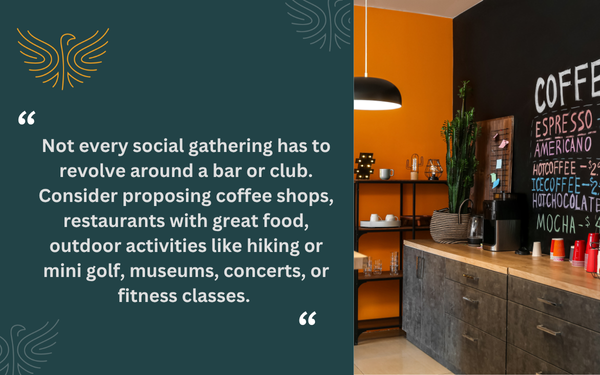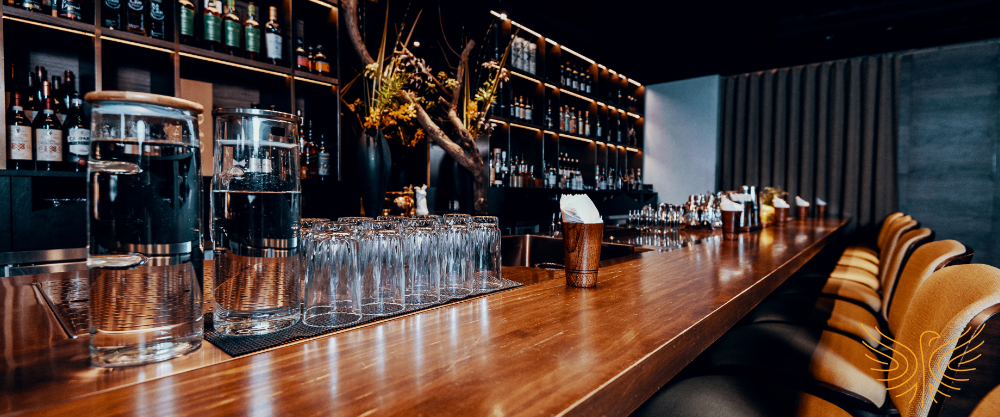For former heavy drinkers, socializing can present a significant hurdle as you strive to maintain your sobriety. After all, drinking is often associated with various social gatherings, like parties, networking, or even casual get-togethers—and navigating these without alcohol can feel daunting, to say the least.
From happy hours after work to wedding receptions, alcohol often seems like the expected norm rather than just one option among many. However, keep in mind that you aren’t alone in your experience and your desire to lead a sober life. It’s entirely possible to have fun, meaningful, and fulfilling social interactions without drinking. So, if you’re wondering how to socialize without alcohol, these tips can help you build confidence and still enjoy yourself.
_______________________________________________________
How Do You Socialize When You Don’t Drink?
Preparing yourself ahead of social situations can help in leaps and bounds. By reviewing the tips below, you’re already well on your way to navigating social situations, without drinking, in a comfortable, authentic, and confident way.
Tip #1: Choose a Different Environment
Not every social gathering has to revolve around a bar or club. Taking control of your social calendar by suggesting alternative venues can completely change the dynamic. Consider proposing coffee shops, restaurants with great food, outdoor activities like hiking or mini golf, museums, concerts, or fitness classes. When you’re the one suggesting the venue, you naturally steer the group toward environments where alcohol isn’t the main attraction.

Morning and afternoon activities also work well—think brunch gatherings, weekend farmers markets, or afternoon picnics. The key is to think about what you genuinely enjoy and invite others to join you in those spaces!
Tip #2: Prepare Your Response
While you don’t owe anyone an explanation, having a few go-to responses ready can eliminate the anxiety of explaining your choice not to drink. Simple responses work best, such as:
- I’m driving tonight.
- I’m not drinking right now.
- I’m taking a break from alcohol.
- I’ll have a soda, thanks.
If someone persists, you can redirect the conversation, such as by saying, “I’m good, how is that new project going?”
Tip #3: Use an Alcohol-Free Substitute
Holding a drink—any drink—can help you feel more comfortable (as well as blend in). Order club soda with lime, ginger beer, mocktails, or even just water with a fancy garnish. Many bars now offer sophisticated non-alcoholic options, including mocktails, that look and feel festive without any alcohol.
Additionally, this strategy gives your hands something to do (reducing nervous fidgeting) and may help eliminate the repeated questions about why you’re not drinking.
Tip #4: Focus on Making Connections
Sobriety actually gives you a significant advantage in social situations—you’re fully present and genuinely engaged in conversations. Use this to your benefit by asking thoughtful questions, actively listening to responses, and remembering details people share with you. People are drawn to those who show genuine interest in them.
Instead of using alcohol as a conversation starter, rely on your natural curiosity about others. Ask about their interests, projects, travel experiences, or opinions on topics you find interesting. You’ll often find that the conversations you have while sober are more meaningful and memorable than those facilitated by alcohol.
Tip #5: Be the Designated Driver
While being around drinking during the initial stages of sobriety is often not recommended, later on, it might be inevitable for certain events (like weddings). Thus, volunteering to be the designated driver gives you a clear, socially acceptable reason for not drinking and positions you as the responsible friend. In fact, many people will actually appreciate and respect you for taking on this role.
Being the designated driver also puts you in control of when the evening ends, which can be particularly helpful if you start feeling uncomfortable or if the energy shifts as others become more intoxicated.
Tip #6: Revolve Your Social Life Around Activities or New Hobbies
Shift your social focus from passive activities (like sitting at bars) to active ones that naturally discourage heavy drinking. For instance, consider joining recreational sports leagues, book clubs, cooking classes, volunteer organizations, or hobby groups related to your interests.
Activities like rock climbing, photography walks, board game nights, pottery classes, or hiking groups can also be great options. When people are engaged in learning or doing something together, alcohol becomes irrelevant to the experience. These settings often lead to deeper friendships based on common interests rather than shared drinking habits.
Tip #7: Find New Sober Social Circles
While exploring new hobbies can help with this, sometimes, recovery and maintaining sobriety involve filling your time with completely new social circles than before. This might include fitness communities, religious or spiritual groups, recovery support groups, professional organizations, or special interest clubs.
Many cities also have sober social groups specifically designed for people who want to socialize without alcohol. Online platforms can further help you find local sober meetups, alcohol-free events, or activity-based groups.
Tip #8: Leave (If You Need To)
If a situation becomes uncomfortable, give yourself permission to leave. If the energy shifts heavily toward drinking, if you feel pressured despite your polite responses, or if you simply aren’t enjoying yourself, it’s perfectly acceptable to make a graceful exit.
Having an exit strategy before you arrive, however, can be a good back-up plan if any of the above occurs. This might mean driving yourself, having a friend on standby to pick you up, or simply planning to stay for a specific amount of time.
Getting Sober Doesn’t Mean You Won’t Have a Social Life
In fact, a lot of people find that going out without drinking actually makes socializing better. You remember the whole night, avoid any next-day regrets, save money, and often have deeper, more honest conversations. But if you’re a heavy drinker and are having trouble quitting, this can be a whole other issue all in itself. Luckily, recovery is possible.
At Freedom Recovery Centers (FRC), our team is here to help you learn healthier coping mechanisms, detox from alcohol safely, and rediscover your spark and purpose in life. You don’t have to do this alone. Call us at 804-635-3746, and begin your journey toward recovery today.
.svg)






.svg)

.svg)



.svg)
